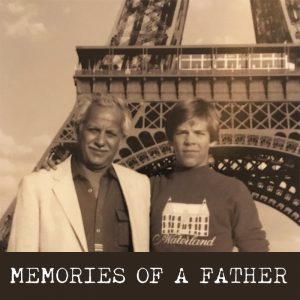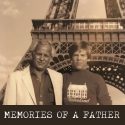
Brian Shulman is a business colleague and friend who’s been a profound influence in my life both professionally, as a software innovator and businessman, and personally, as a mentor of tremendous character. Brian is not involved in the music industry himself, but I was fascinated to learn about his late father, Stan Shulman, who was a record producer, artist manager and product innovator. Like many folks who work behind the scenes in the biz, Stan’s story is shrouded in mystery.
I sat down with Brian at Virago in Nashville, Tennessee one evening to get some of the back story. As a musician, songwriter and record producer myself, what I learned was truly inspiring.
Ernie: So, Stan Shulman is not a name that is widely known, but like many unsung heroes working behind the scenes in the music and entertainment business, he helped a lot of people become famous and had an influence on pop culture in the 60s & 70s.
Do you know much about his childhood?
Brian Shulman: I vividly remember my father’s great stories about growing up in Brooklyn and having to fight through the Catholic boys who were trying to beat him up as he would walk to and from school. He grew up an Orthodox Jew and went to school from 7am-7pm. He was in and out of orphanages a good bit and didn’t have the best home life, but somehow made the best of it.
Ernie: Amazing. Brooklyn orphanages, which were predominantly Catholic must have been pretty tough for a Jewish kid. I’ve heard Brooklyn was a very different place back in the 40s.
Brian Shulman: As I’ve grown older, I’m even more amazed and awed by how he stopped the cycle of violence he grew up with and never brought that into our home. He was my best friend and I learned so much from him.
Ernie: Given your interest and success in sports, did Stan play football or give you any early coaching?

Brian: He never played football but loved the game and loved watching me play. He never taught me to throw or catch or punt but supported me 100%. He did, however, teach me incredible lessons on work ethic, business skills, negotiating and how to treat others.
Ernie: He eventually got out of the streets of Brooklyn?
Brian: He joined the Marines at 17 to get out of Brooklyn because he was pretty heavy into gang fighting and was sure he would be killed at some point. He was shipped off to fight in the Korean War as corpsman and was among the 1st Marines Division who were stuck in the bloody battle of The Chosin Reservoir.
Ernie: Wow, I’m a bit of a war history buff. If I remember correctly, The Chosin Reservoir battle was terrible. US forces lost half their men breaking out of an encirclement against brutal odds, badly outnumbered, over mountainous terrain in sub zero weather. It was one of the greatest battles in US history – as bad or worse than the Battle of the Bulge in terms of fighting conditions.
Brian: Yeah, he made it out but said it was one of the worst times of his life. He suffered numerous lifelong health issues because of it. His mental toughness from that experience was incredible. He talked about always moving and trying not to stay in a foxhole even though enemy fire was coming at him from all directions — always advancing even though everything in his body was telling him to stay put. This later became amplified as part of his life philosophy as well: keep moving. Don’t rest on your laurels. Don’t get too comfortable.
Ernie: Anybody that survived Chosin was lucky to be alive. I can’t imagine what it was like to come back to the States after that. How did he adjust to civilian life?
Brian: After the Korean War, he was going to USC (University Of Southern California) on the GI Bill and then landed a job at MCA (Music Corporation of America) in the mail room. He eventually worked his way up to mail courier or gopher for some of the music agents.
Ernie: That’s the cliche narrative of the American ethos: working your way up from the mailroom!
Brian: It is, and he was a relentless worker. He often told me, “you should always prepare for next week’s work this week.” And he firmly believed that out-working others would always get you ahead. There is a great story about that:
One Sunday night around 9pm, he was in the office preparing for the week when two armed security guards show up to arrest him. Turns out Lew Wasserman, head of MCA, was driving by that night and thought there was a burglar in the building. When he told them he worked there and was preparing for the following week, Mr. Wasserman was so impressed by his work ethic that he immediately promoted him to his personal assistant. After several months of incredible training, Dad was promoted and had the opportunity to manage Jill St. John and Jayne Mansfield. It was an incredible opportunity for him and all of it came out of working harder than everyone else.
Ernie: Ha ha, Mr. Wasserman must have really liked him if he handed him two of the most alluring starlets of the time. So, at some point he transitioned from working at MCA to striking out on his own as an impresario, label manager and record producer…
Brian Shulman: Right, I’m not sure of all of the background on how it started but I do know that he was managing the artist Ray Peterson, and after getting Ray released from his contract with RCA, they founded Dunes Records, naming it after the famous Las Vegas hotel. They focused a lot on the doo-wop singles market, which was very lucrative at the time.
Ernie: And they scored a hit record for Ray with, Corrine, Corina. Didn’t they hire Phil Spector to employ his legendary “Wall Of Sound” on several of their singles?
Brian: So, Dad found the young Curtis Lee in 1960 working clubs in Long Beach and brought him to New York to record in the Brill Building with Phil Spector. I remember dad telling me how he was immediately blown away with Phil’s talent and creativity. Although my Dad wanted to be as good as Phil and loved producing records and finding new talent, he always felt like he was much better at the business side of things. He traveled the entire country in a powder blue convertible Cadillac with a trunk load of singles with some cash in each one. He would visit all the local DJs and push his artists’ records to get airplay. The good ole days!
Ernie: Payola, baby! Greasing the palms of the DJs and program directors was the name of the game.
Brian: Pretty Little Angel Eyes was another big hit for the label. My mother even cut backing vocals and claps on several songs including, Angel Eyes. There may have been others on the record as well — in the same studio building where they recorded those hits, there were many other famous artists recording and they used to help each other out. Dad said Little Anthony and the Imperials would always be practicing in the bathroom because the acoustics were so great.
Ernie: Ha ha, natural reverb.
Brian: Dad also launched Tommy Boyce’s career and had him write with Ray and Curtis for some memorable hits. Tommy went on to tremendous greatness with his songwriting. My mom and dad spoke very highly of Tommy.
Ernie: Speaking of your mother, whom I’ve had the pleasure of meeting, I know she’s originally from Anniston, Alabama. So how did they meet?
Brian: So, my mother, Joyce, was the classic small town southern girl who wanted to see the Big Apple. She moved in with her Italian cousin and my dad was across the hall. Pre internet dating.
Ernie: And that’s eventually what led the family back to the south after you were born?
Brian: She couldn’t stand the city anymore. New York City was on the decline in the late 60s, and it wasn’t the best place to raise a kid. They relocated to Nashville in 1970.
Ernie: That’s a good segue into my next topic. I think the aspect of Stan Shulman’s career that I find most interesting was his involvement with K-Tel Records in the 70s. It was sort of a career comeback move making use of Nashville’s outstanding studio system, and from what I read in 50 Years Of Music Row by Michael Kosser, it kept a lot studios, engineers and session players very busy with consistent work — by one account 2500-3000 sessions. How did all that come together?

Brian: I will never forget the morning my father told me about the TV marketing idea he had. He had been struggling with his health. He would get up very early every day, like 4 or 4:30. He would take long baths because his phlebitis would hurt so bad in his legs. I would always come say goodbye before school. He would be reading the Wall Street Journal or a music trade mag like Billboard. There would be tons of yellow legal paper with his scribbling all over them. Even though he had a double bypass at age 37 in 1972, the room would be filled with smoke and cigarette butts all over the place.
Ernie: Yeah, his generation smoked. We had put a man on the moon and split the atom but we couldn’t admit to ourselves that inhaling this thick, smelly, tar-filled tobacco smoke was bad for our health.
Brian: We would spend 15-20 min every morning just talking about all sorts of things. This one morning he described for me how he had several artists that were pretty down on their luck, not making much money but there were people out there that still loved their music. He had found a way to re-record their hits and put them on a compilation album and then sell them all over the world through a TV marketing company called K-tel. Obviously this was pre-internet so there was an entire generation in the US and even larger throughout the world that hadn’t heard Little Richard, Chuck Berry, Jan and Dean, Pat Boone, Connie Francis, Paul Revere and the Raiders, Harry Belafonte and the list goes on and on.
Ernie: That’s incredibly innovative. In fact, I’ve heard so many horror stories about artists who, despite hit records, had a bad record deal with pitiful royalty percentages, and no rights to their original master tapes. Many times the titles would just go out of print, and the owners of the masters would have no interest in re-release. Not to mention, many of those old hits were recorded in mono and the sound didn’t translate well to contemporary 70s FM radio.
Brian: Exactly. My father would fly these guys into Nashville, get great studio musicians to play with the old artists, re-cut them in stereo with better technology and sound and then release them through K-tel internationally. Many artists stayed at our house and it was great to meet all of them. My dad loved telling me about the artists and their careers. He would make me listen to their songs and stop the reel to reel tape to explain what they did to make it sound so great. All of the artists were nice to me and I absolutely loved watching my dad work in the studio.
Ernie: It really is genius. Most labels are just trying to get a hit single to push an album’s sales enough to recoup all the losses on the albums that don’t sell. With your father’s strategy, every song is a bonafide hit by the original artist, and no licensing deal is required with the originating record company.
Brian: And they sold all over the world. We were able to travel the globe as he negotiated agreements with third-party companies in countries like Japan, Holland, the UK, Canada, France, Germany, Greece, Italy and the list goes on. It was an incredible experience as a young man to learn about all of this. He also had the foresight to take me with him to some of the meetings. I remember sitting in the room at age 15 in Cannes France at the MIDEM convention with all of these big-time record company execs from all over the world and listening and watching their faces as they discussed different aspects of the deals. I’m so thankful I had that opportunity and he included me in those meetings.
Unfortunately K-tel went bankrupt and didn’t have to pay a lot of people all the outstanding royalties owed, including the artists and my dad. He passed away at 53 from heart failure but my mother has never had to work because he invested extremely well.
Ernie: I know you’re a very active investor in the market and with your private equity firm, Princeton Capital Partners. You mentioned Stan taught a lot of investment principles early on?
Brian Shulman: One of the areas we spent a considerable amount of time discussing since I was probably 8 or 9 was the stock market. I remember one time we discussed this company and he made me read this article on their brilliant CEO. The stock was outrageously expensive at $242 per share. I liked several of the companies they invested in and the CEO discussed things that I didn’t completely understand, but seemed to be simple and logical to me even at my age. My father loved the company and the CEO so we bought some. I still own it today and I try to read all I can about the brilliant CEO, Warren Buffet of Berkshire Hathaway. I take a lot of pride in the fact that I never sold it. Many of Buffet and Charlie Munger’s ideals about investing impact my own strategy now with Princeton Capital Partners. I remember when I signed my first contract with the Green Bay Packers in ’89 and I took my entire signing bonus and bought Home Depot stock. Every time I research companies and decide to invest, it brings back great memories of Dad and I discussing the incredible power of investing and the importance of working hard in everything you do, including homework on what you will invest in.
Brian Shulman is the founder and former CEO of an education software company, LTS Education Systems. He is the author of The Death of Sportsmanship and How to Revive It and has addressed issues of sportsmanship and steroid education before Congress, the United States Air Force Academy’s Center for Character Development, and other groups supporting the cause.
